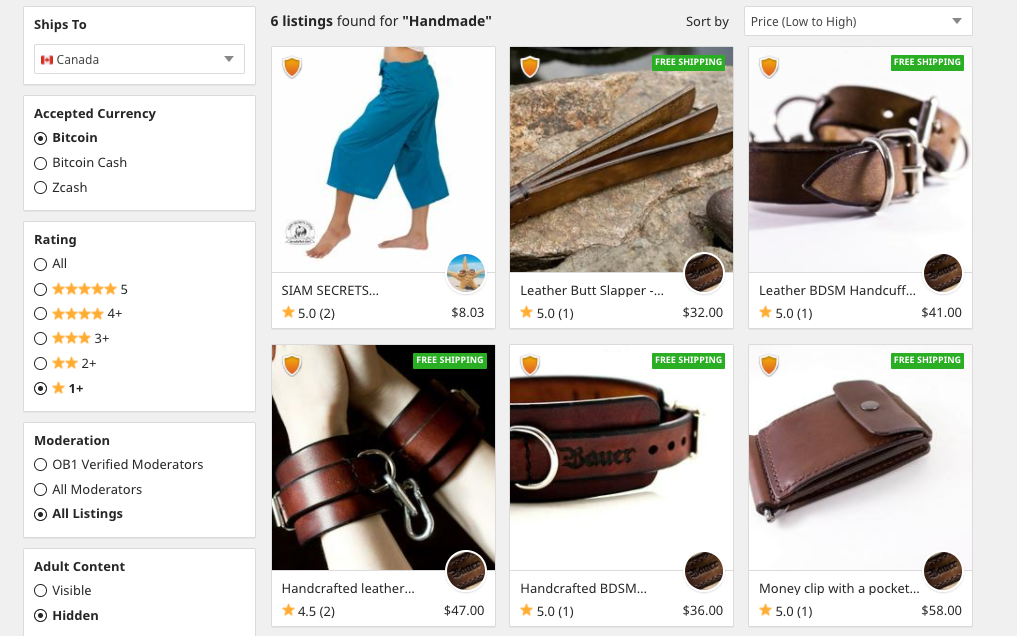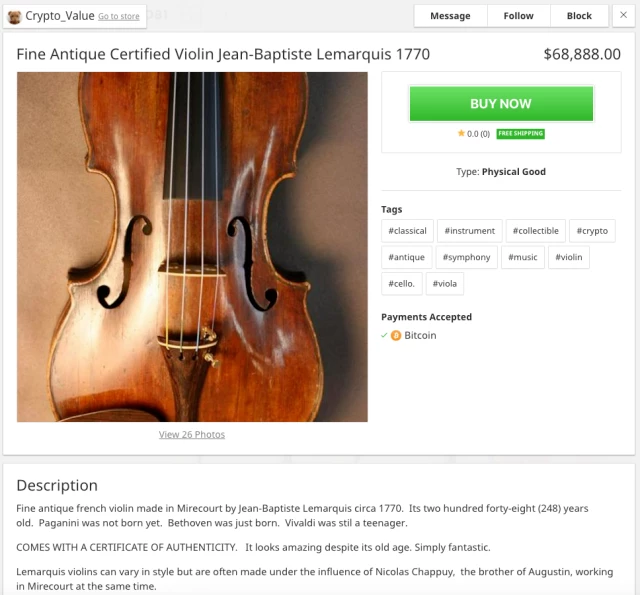Whether you’re in the market for crypto swag, vintage video games, instruction manuals for discontinued electronics, or hand-stitched leather sex toys, OpenBazaar has you covered.
The open-sourced application acts as a sort of hybrid Amazon, Etsy, and eBay for crypto-based transactions, providing a decentralized marketplace with no fees, no middlemen, and complete anonymity. “When you’re doing business, just like you would in a bazaar in person, it’s truly peer-to-peer: There’s nobody snooping in on your business,” explained Brian Hoffman, the project lead of the OpenBazaar protocol and the cofounder and CEO of OB1, one of the markets that runs on that protocol.

Four years after launching OpenBazaar, Hoffman is preparing to release a new iOS and Android mobile app that he believes has a real shot at widespread adoption. Haven not only brings the OpenBazaar marketplace to mobile platforms, but also provides a range of new features, including anonymous chat, a decentralized social network, and a way to privately transfer and trade crypto person-to person.
“The reason we changed the branding is we wanted to create a safe haven for people to do online trading with crypto,” says Hoffman. “We’re demo-ing the app in its current state, and we’re hoping to release it really soon, provided the app stores allow it.”
The new branding is also an attempt to distance the mobile app from the OB1 market, says Hoffman, as the two were built for different purposes and different audiences. While he describes the desktop version as being inspired by (and not entirely dissimilar from) Silk Road, the mobile application is intended to be more welcoming to a mass audience.
After spending a few hours browsing some of the tens of thousands of items listed on OB1, it’s safe to say the new application’s biggest challenge for attracting mainstream users will be offering more mainstream products. While users can easily purchase DVDs of pirated movies, a $490,000 Louis Vuitton teddy bear, a $69,000 antique violin or a $150 tandem paragliding tour in Switzerland using the platform, it’s difficult to find common household items people tend to buy on Amazon—light bulbs, Instant Pots, dry-erase markers.

BREAKERMAG spoke with Hoffman at the North American Bitcoin Conference, in Miami, where he announced the mobile app as well as an update that will further open the platform up to more users.
On the day of his presentation, OpenBazaar’s 120,000 users received a request to update the platform for the first time in nearly six months. The update includes a multi-wallet that allows them to transact using a range of new cryptocurrencies, after previously only being compatible with bitcoin, Bitcoin Cash, and ZCash. Hoffman says ether will be next, and they’re considering Dash and Decred as well.
After all, Hoffman acknowledges the average person might not be entirely comfortable logging onto a platform where they can anonymously purchase weapons, drugs, sex toys, or expensive electronics still in their original packaging at suspiciously low prices.
While OpenBazaar does let users block adult content from view, sellers have to self-report what constitutes “adult,” and they’re evidently quite liberal with that definition. According to a recent search, the sellers of handcrafted leather BDSM products such as a “hogtie kit” and a “butt slapper” don’t consider such things censor-worthy.
"We want people in the mainstream to use OpenBazaar and have a good experience and not be inundated with drugs and weapons."
“We want people in the mainstream to download and use OpenBazaar and have a good experience and not be inundated with drugs and weapons, which for a lot of people is an immediate turn-off,” says Hoffman. “Haven is an attempt to cater to that audience.”
Hoffman says the original desktop application was all about censorship resistance, decentralization, and openness—core tenants of the crypto community—all of which may be a bit too “wild west” for mainstream users. In Hoffman’s defense, much of what’s listed on the decentralized market today isn’t as far to the fringe as a leather butt slapper, and some items even resemble the hand-made and second-hand products one might expect to see in more traditional online marketplaces.
“Haven is the first time we’re saying we want you to be able to tell your friends to use this app and they’re not going to be like ‘Oh, this is Silk Road again,’” he says. “We want them to think of it being as comfortable to use as Etsy or eBay. They’re just using crypto.”
The app is also a way of showing developers what sort of decentralized applications can be built on top of the OpenBazaar protocol. Hoffman expects Haven to be appealing to developers looking to create their own decentralized marketplaces.
“That was always supposed to be a demonstration of how the protocol would be used,” he says. “We always expected other people would build maybe a Chinese-specific version on top of the protocol, or a clothing version. This is the first one that’s built on top of the technology of OpenBazaar, but it’s catered to mainstream users.”
To get the mainstream adoption Hoffman is hoping for, the app will have to demonstrate a number of improvements over the desktop application. The anonymity of the decentralized project not only complicates censorship, but also provides users with few assurances, seller ratings, or ways to verify the credibility of the other party.

The bitcoin-themed pin, sticker, and physical coin that I purchased over the platform for a few bucks did arrive on time and in good condition, but I probably wouldn’t be comfortable putting half a million dollars into my account to scoop up that Louis Vuitton teddy bear, or a $69,000 violin.
“When you buy something from Amazon or Etsy, you trust the marketplace itself, you know there’s a huge company running it, and if there’s a problem or you have a dispute with a merchant they’re going to come in and mediate that problem,” Hoffman concedes.
How do you offer protection or guarantees in a completely decentralized, anonymous marketplace? OB1’s solution is a crowd-sourced mediation system. Smart contracts allows anyone on the network to be a moderator, and anyone to offer them as dispute-resolution intermediaries.
Upon checkout, users are required to choose between a “verified moderator” and “direct payment,” accompanied by a warning to choose only the latter if they are working with a seller they trust. Those who choose the moderated option will have their payments held in escrow, and will retain the option to open a dispute with the seller and their designated moderator for up to 30 days after the order is fulfilled. Should they ultimately require a moderator, both parties are charged a fee to reimburse moderators for their assistance.
OB1 hopes to offer browser-to-browser purchasing by the end of the year, sidestepping servers entirely.
Though it’s far from perfect, Hoffman believes it’s a fairer approach than those employed at more established marketplaces, which abide by the “customer is always right” adage in disputes, he says, much to the frustration of merchants. As for the suspicious and potentially illegal stuff on the market, Hoffman says it’s up to users to police it themselves. “In the case of OB1, we let users report fraudsters, bad guys, things like that,” he says.
More serious, OpenBazaar lacks user reviews, which on other marketplaces are vital for ensuring quality standards. After hours spent browsing the platform, I found that about 90 percent of users have no reviews, and about 10 percent have five-star reviews. The platform seems almost entirely absent of any rating in between.
Hoffman says OpenBazaar doesn’t have enough scale to provide a robust rating system, but believes it matters less to users of the decentralized application than it does to users of more mainstream online marketplaces. “The reviews matter more as the marketplace gets bigger and more liquid, because when you search T-shirts and find 600 comparable shirts from different places, you need reviews to figure out the best option,” he explains.
With the Haven app just around the corner, Hoffman says 2019 will be a big year in proving the concept of a decentralized marketplace. Though it may seem far-fetched, especially given the limitations of the desktop application, Hoffman is confident there is a growing need for free, anonymous online exchanges.
“We live in a client-server architecture—Amazon hosts it and you just browse to it. In the future, browsers will talk to browsers directly, and that way all your data is on your device,” he says (OB1 hopes to offer browser-to-browser purchasing by the end of the year, sidestepping servers entirely). “That’s when we’re going to hit super parity with mainstream apps, and it’s going to start dis-intermediating big businesses.”